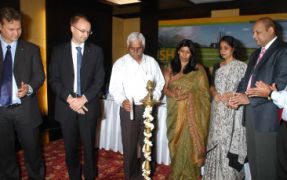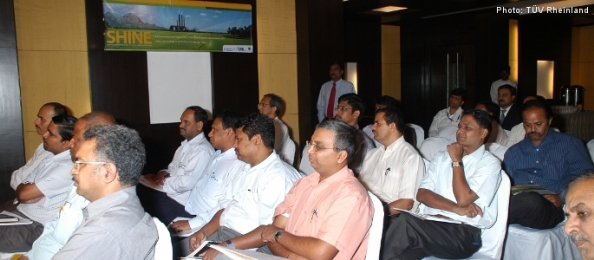Systematic and Holistic Program for a Balanced Industrial Ecology
In Karnataka, one of the fastest-growing states of India, officials have become aware of the increasing pollution and exploitation of natural resources by the major industries and the growing population. Indian energy production has risen over 20 percent since 2000; during the same period, CO2 emissions went up by nearly 30 percent. The Karnataka State Pollution Control Board (KSPCB) has identified 118 companies – the majority small- and medium-sized enterprises (SMEs) – from all the main industries that are using resources inefficiently and are polluting the environment. More than half of the companies are located in the district of Bangalore and are a constant threat to the ecological balance of the region.
TÜV Rheinland and the KSPCB are taking part in the public-private partnership project Comprehensive Programme for Enhanced Productivity and Sustainable Industrial Ecology (CP-EPSIE) in Karnataka, which targets the increasing pollution from the major industries in the region. The program will focus on mass awareness of environmental concerns and the alignment of the companies’ systems with international standards. The TÜV Rheinland team will conduct the assessment according to the internally developed guidelines and rate the companies accordingly. Ten pilot companies have been selected for this exercise. The aim is to develop best practice examples regarding environment, health, safety, and social accountability focusing on SMEs. The KSPCB will support train-the-trainer activities, which are part of the awareness campaigns. The understanding of the importance of environmental protection will also help to improve management methods.

Photo: TÜV Rheinland
In addition to protecting the environment, state officials are motivated by the decreasing competitive advantage of their region in attracting companies – a result of insufficient resource allocation in the area. The enterprises affected have often developed from being regional producers to becoming global exporters. In this context the enterprises have to tackle the various economic threats around them. Scarcer resources and rising wages are a consequence of the augmenting pollution. Moreover, the international acceptance for unsustainable products is decreasing. Export markets are demanding fair products and sustainable behavior is becoming an important factor to win attractive investors.
The approach is to eliminate the weaknesses and to build on the strengths of a company. Therefore, the focus of the present Public Private Partnership (PPP) project with KSPCB is on reducing pollution levels and improving the working conditions as well as the quality management of the companies affected. The project especially supports Principles seven to nine of the UN Global Compact, supporting initiatives that enable companies to take on greater environmental responsibility; as well as respecting labor rights regarding occupational health and safety and social accountability.
The program will seek to address the issues on three levels. It follows a pyramid principle of information, engagement, and implementation of best practices.
At first, an information campaign will be launched to inform entrepreneurs about the necessity of environmental concerns such as cleaner production lines, energy efficiency, process optimization, and the benefits of having an international rating. To achieve this, forums and workshops are set up to create awareness of environmental concerns. A roundtable for managers will be created in order to connect top decision-makers from various regional SMEs regarding the topics of sustainability.

Photo: TÜV Rheinland
In a second step, a group of 15 to 20 experts is identified from various sectors, such as industry, academic, and civil society, who are qualified to act as multipliers training the trainers and setting up activities such as workshops and seminars. Experts from the various sectors involved will be trained to create a greater impact in the target region. The sustainable practices will then be implemented in the 10 selected pilot companies. These companies will build capacities for changing their products to make them more sustainable. In the course of two months, six employees of each of the 10 companies participated in the training on international standards. The commitment to an environmentally friendly production will be put into practice by implementing international standards such as the Global Reporting Initiative Guidelines, the social accountability standard SA 8000, the environmental management standard ISO 14001, or a combination of those tailored to the company into the value and supply chain.
As a third and final step, the 10 companies of the implementation phase will serve as showcases and best practice examples to demonstrate the benefits of an environmental management system. The program will also be able to help design and launch a new comprehensive system to assist in changing to a more sustainable form of production, even in SMEs. An e-learning kit will be created to inform at least 200 additional companies from the region.
A possible setback for the ambitious project could be that the 10 participants will not be capable of meeting the certification and rating costs in the future, which will become necessary investments if the companies want to keep the certification. Additionally, the determination to implement laws and regulations regarding environmental protection in India might also have a negative effect on the project’s success. With this project, companies are encouraged and supported in changing their behavior over the long term.
The main effect of the PPP project will be the development of an improved alignment with international standards and practices on environment, health, safety, and social accountability. The Comprehensive Programme for Enhanced Productivity and Sustainable Industrial Ecology demonstrates the possible fields for sustainable management for highly polluting SMEs in the area of Bangalore. The project leads to increasing awareness and identification of potential for a change toward sustainability.
Promoting and achieving global standards will help the SMEs in Bangalore to better adapt to the requirements of a global supply chain and meet the demands of a global market. Domestic enterprises have often been unable to expand their investments due to a lack of alignment with international standards. Companies that have a globally accepted rating will have a competitive advantage compared to their peers, and at the same time be supporting the sustainable development of the region.
This project description was originally presented in the Global Compact International Yearbook 2010.
Mr Bhaskar lives in India and works for TÜV Rheinland Group.
Dagny Buehler-Thierfelder is CSR manager at TÜV Rheinland Group.
About Us // Privacy Policy // Copyright Information // Legal Disclaimer // Contact
Copyright © 2012-2018 macondo publishing GmbH. All rights reserved.
The CSR Academy is an independent learning platform of the macondo publishing group.









